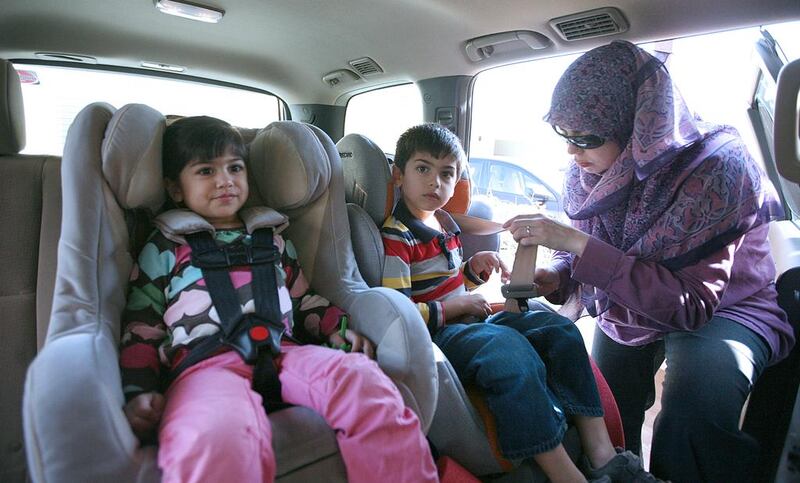DUBAI // Road safety experts have called for compulsory child car seats and seat belts, and federal traffic laws, to reduce road fatalities.
Better regulation of heavy vehicles, a code for road users and improving driver attitudes are also crucial for reducing crashes, speakers told the Gulf Traffic Conference 2013, in Dubai until Wednesday.
Simon Labbett, regional director of the Transport Research Laboratory, on Monday said it was high time drivers learnt to buckle their children in and that seat belts became mandatory for everyone in the car.
“It is very frustrating watching adults wearing seat belts in the front of the vehicle yet their children are bouncing around in the back waving at drivers ,” said Mr Labbett, whose company helped to develop Abu Dhabi’s road-safety strategy.
“They are at far greater risk of injuries than their parents are.”
He said moves to curb speeding and bad driving behaviour were helping to reduce the number of deaths but they were not enough.
“We haven’t got legislation for wearing seat belts in the rear of vehicles and child-safety seats,” Mr Labbett said.
“Abu Dhabi and Dubai have an interest in road safety but you can’t do it in a fragmented basis. It needs the federal authorities like the Ministry of Interior or the National Transport Authority to take that next step.”
A spokesman for Abu Dhabi Police said laws making car seats compulsory for children were being planned.
“Abu Dhabi Police is working on new legislation,” said Musallem Al Junaibi, head of engineering and roads with the department of traffic and patrols.
“The new legislation will have rear seat belts, car seats for children below 12 years and rear-facing car seats.
“But we need to work on the behaviour of drivers and road users. We don’t want to have clashes with users. They shouldn’t think police are trying to force them or want to collect fines.
“We want to change their thinking. Speeding, drink-driving or jumping red lights are all related to driver behaviour.”
Mr Al Junaibi said the capital’s police force hoped to achieve its target of no fatalities by 2030.
“We have achieved a decrease in pedestrian deaths to 2.2 for every 100,000 people,” he said.
Last year there were 8.66 deaths on the emirate’s roads for every 100,000 people, down from 10.65 in 2011, Mr Al Junaibi said.
Speeding and sudden lane deviation were the main causes of accidents, Mr Al Junaibi said.
But Mr Labbett said a unified road code was much needed.
“We need better regulation of heavy vehicles on our roads, more work on pedestrian safety and setting driver standards by issuing a road code that sets standards for all road users, whether you are a driver, motorcyclist, truck driver or even a pedestrian,” he said.
“It should be a federal document that is available and used in schools and is the one-stop standard across the Emirates for every single road user.”
pkannan@thenational.ae






